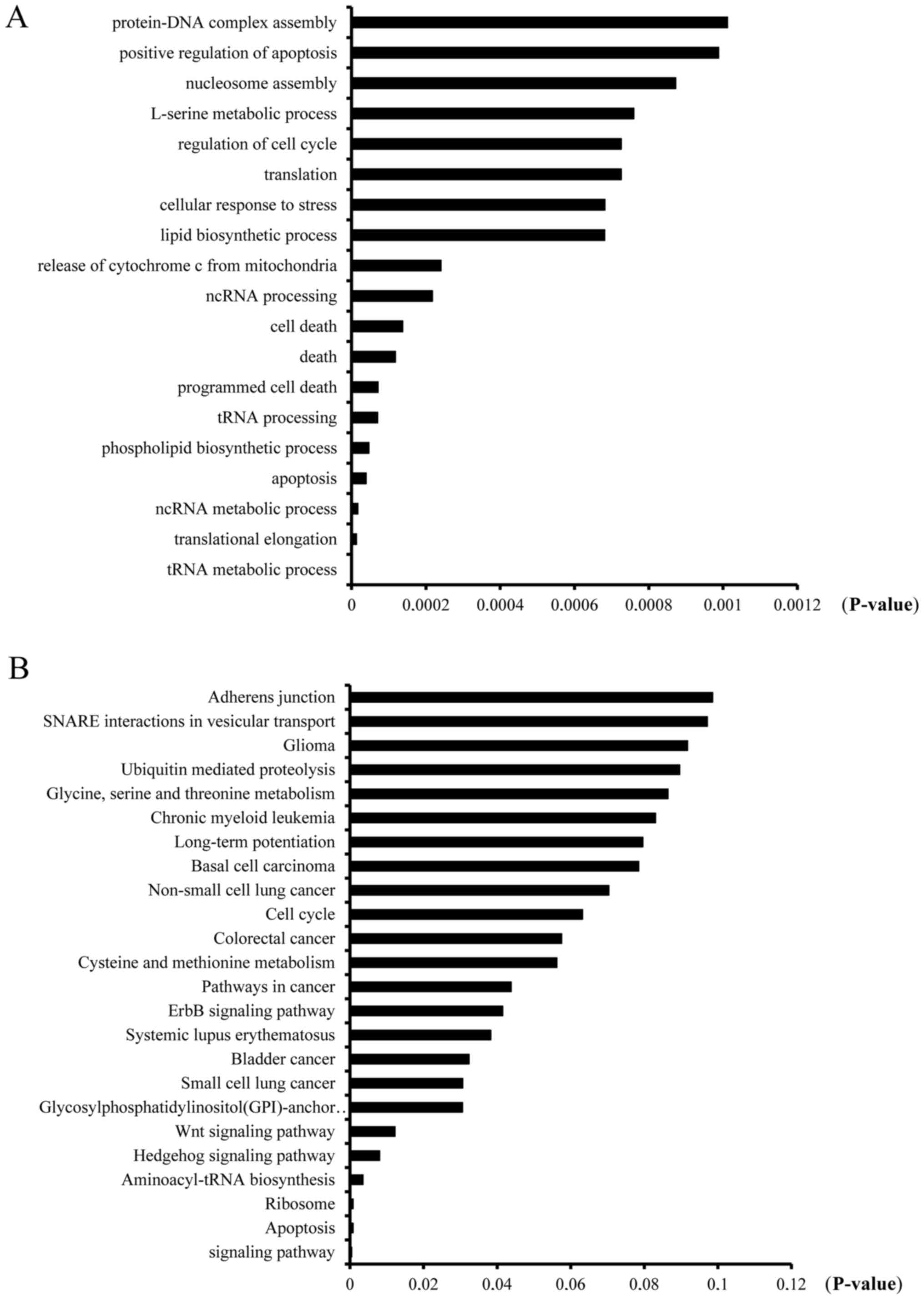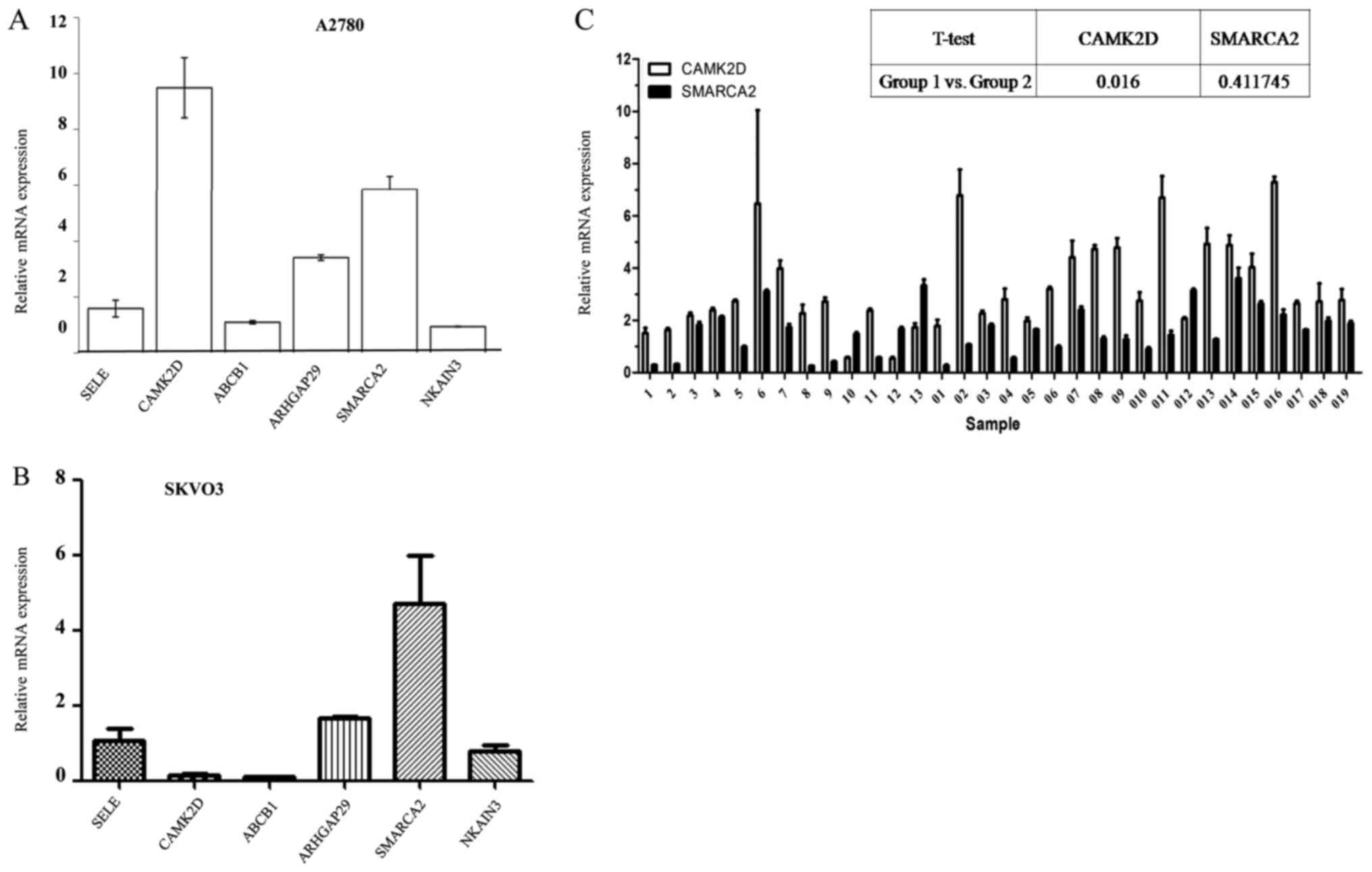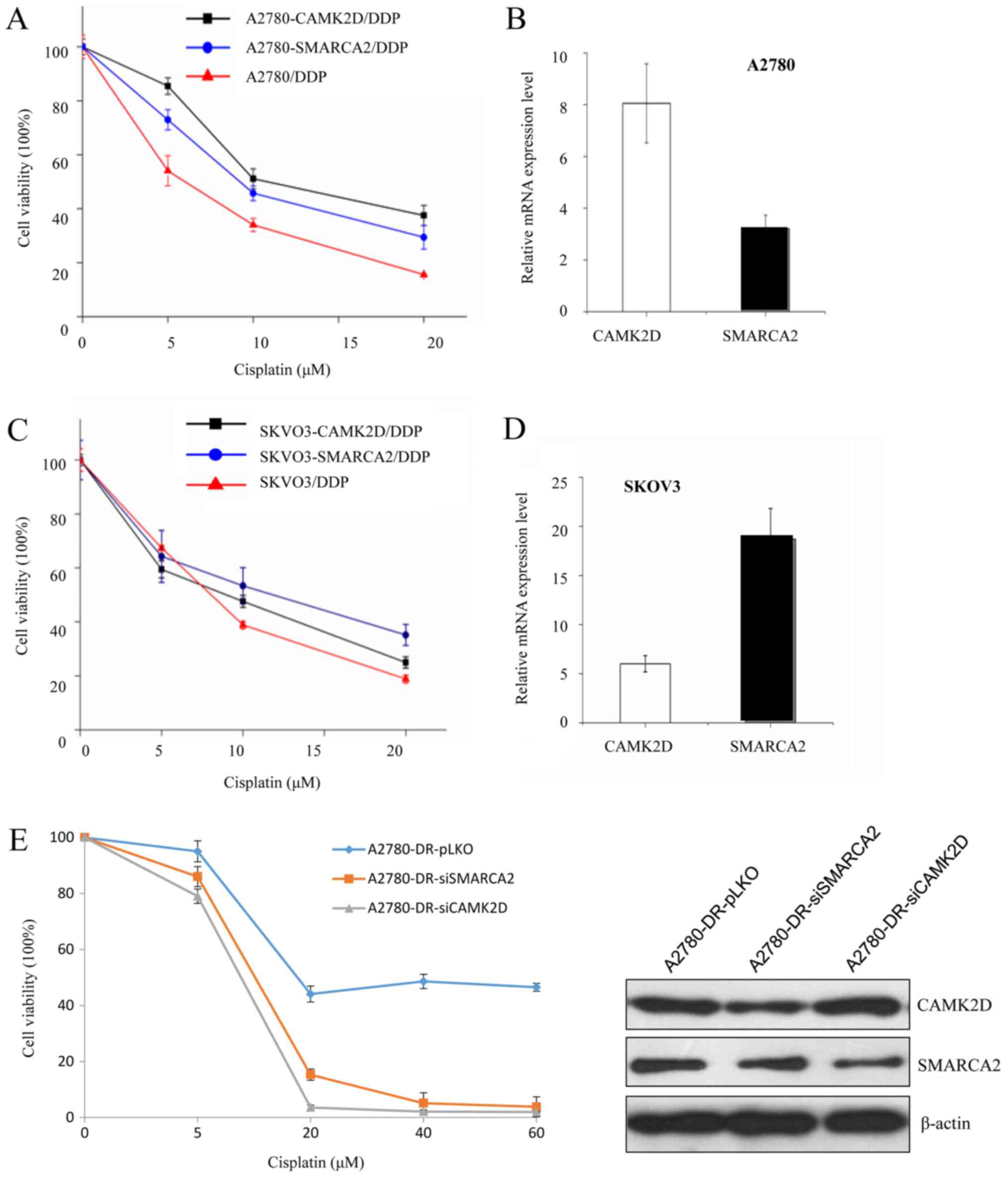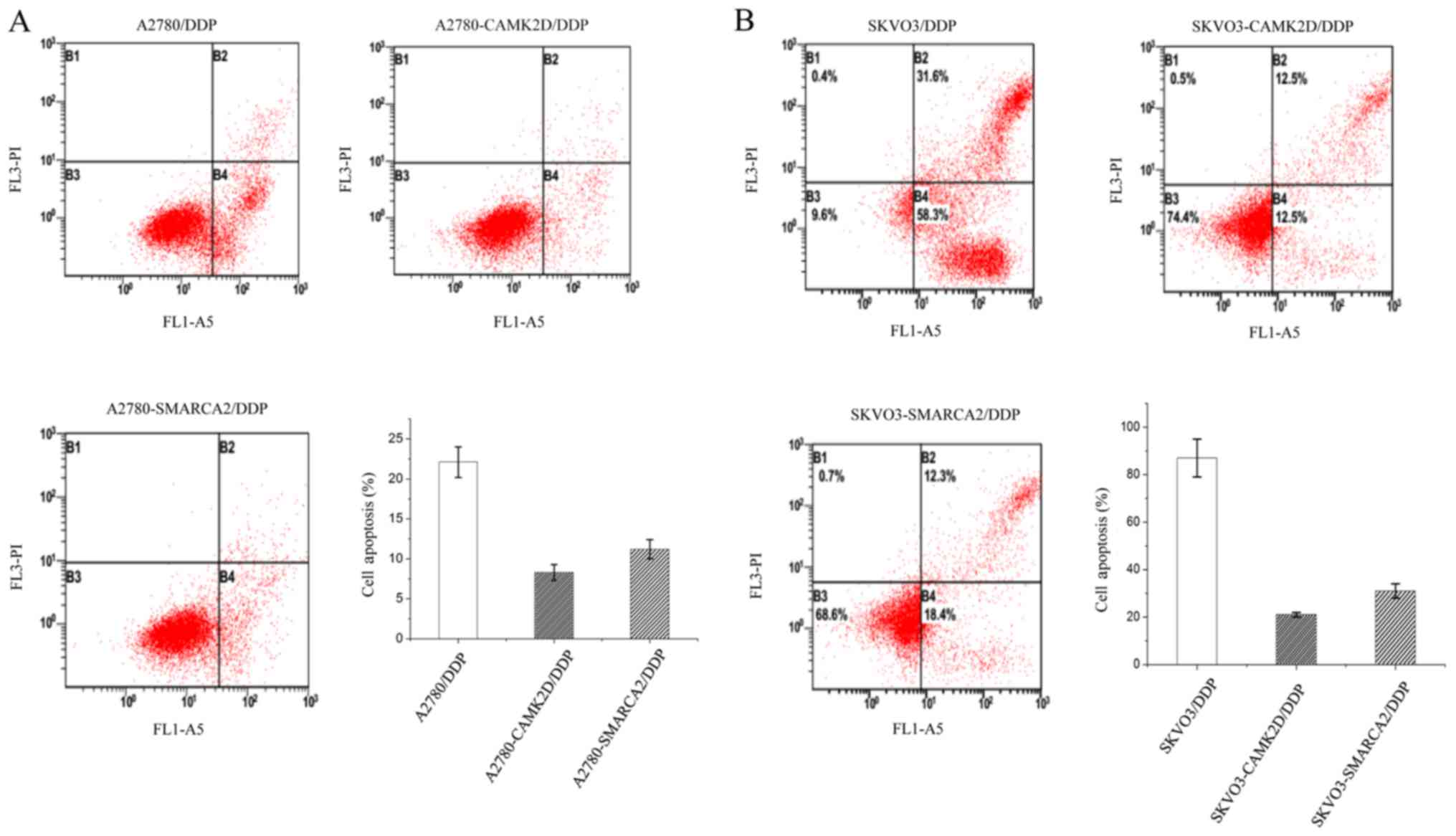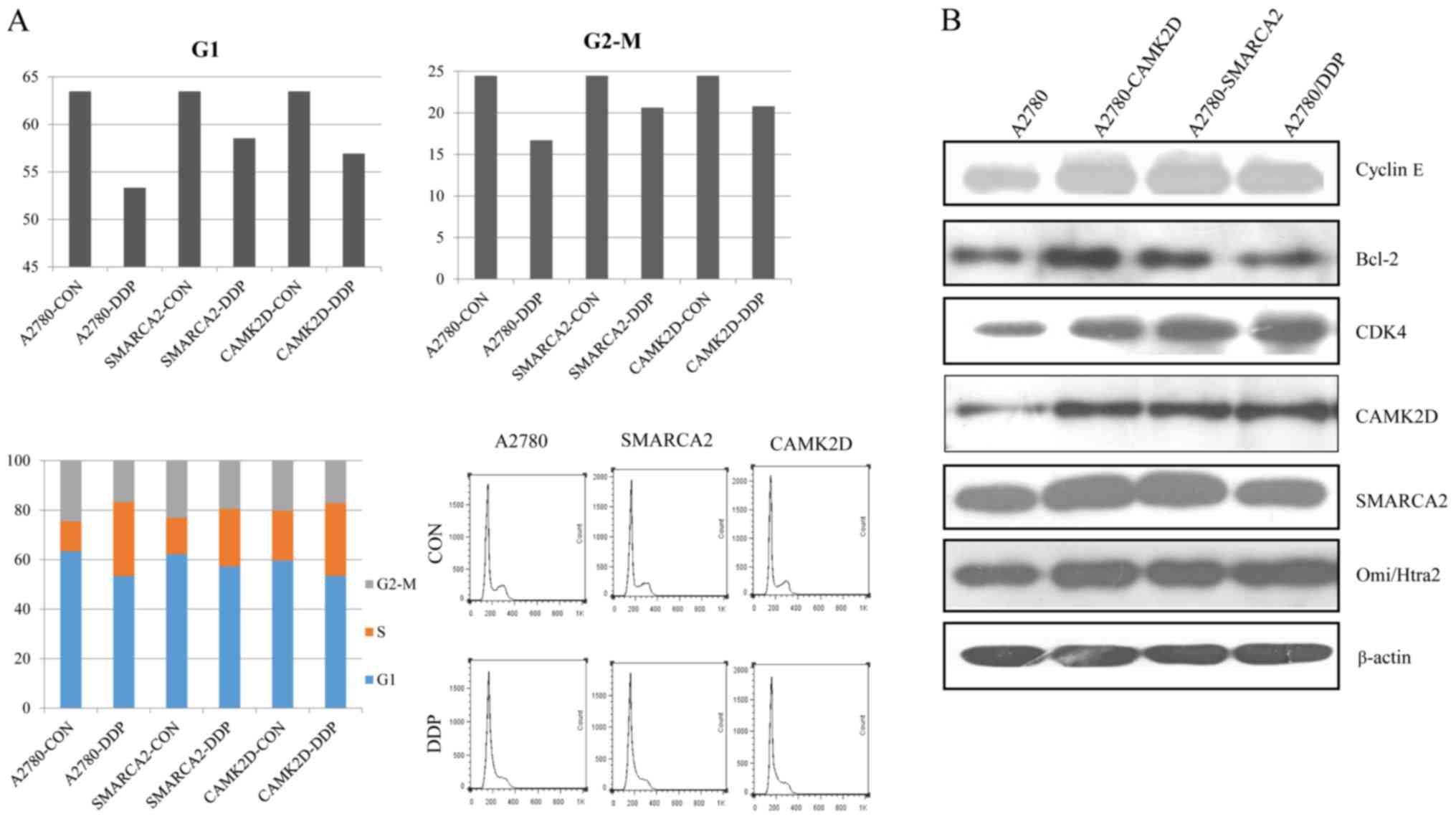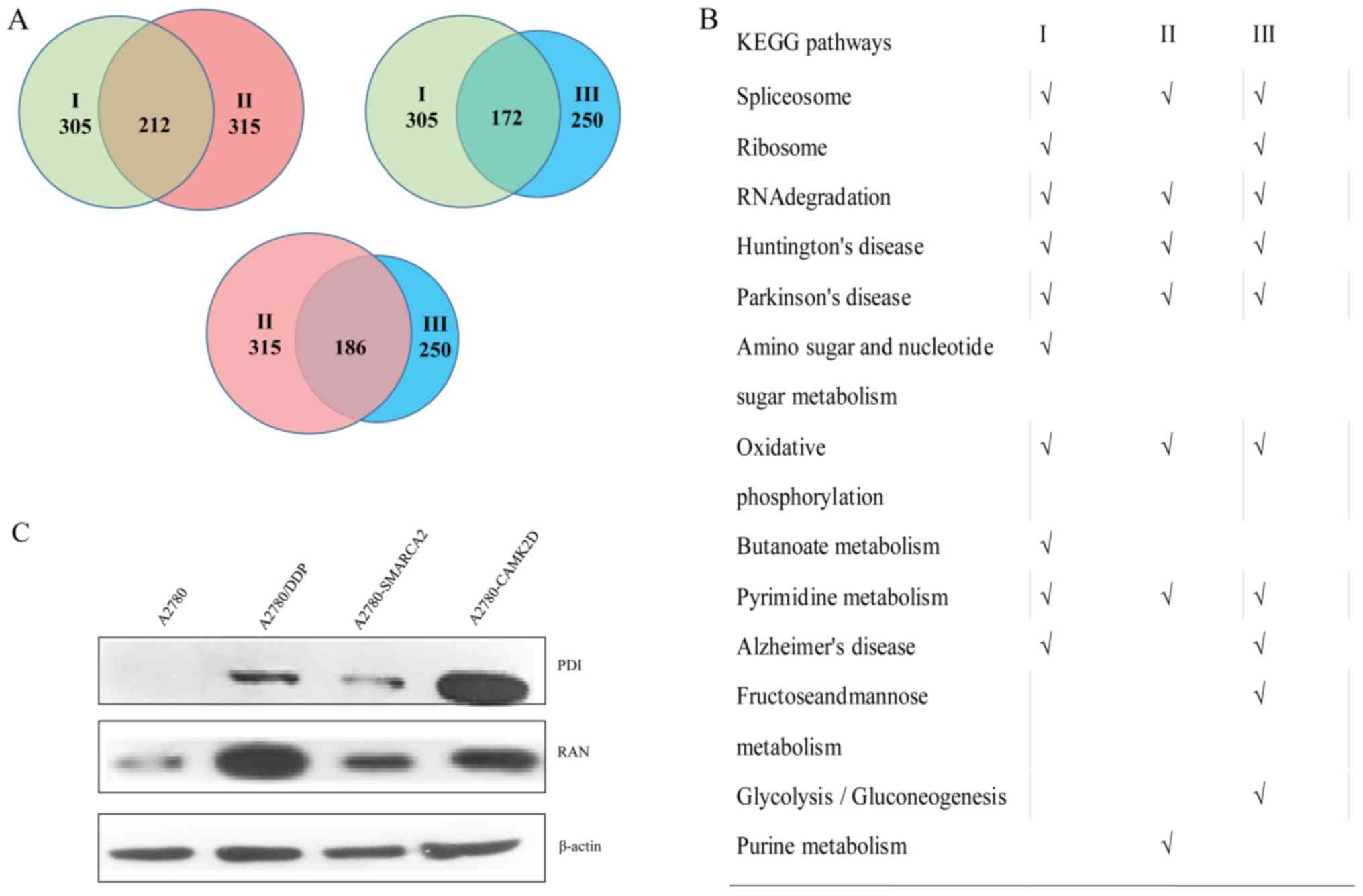|
1
|
Wu H, Wang K, Liu W and Hao Q: Recombinant
adenovirus-mediated overexpression of PTEN and KRT10 improves
cisplatin resistance of ovarian cancer in vitro and in vivo. Genet
Mol Res. 14:6591–6597. 2015. View Article : Google Scholar : PubMed/NCBI
|
|
2
|
Schumann C, Chan S, Khalimonchuk O, et al:
Mechanistic nanotherapeutic approach based on siRNA-mediated DJ-1
protein suppression for platinum-resistant ovarian cancer. Mol
Pharm. 13:2070–2083. 2016. View Article : Google Scholar : PubMed/NCBI
|
|
3
|
Duan Z BK and Seiden MV: Inhibition of
ABCB1 (MDR1) and ABCB4 (MDR3) expression by small interfering RNA
and reversal of paclitaxel resistance in human ovarian cancer
cells. Mol Cancer Ther. 3:833–838. 2004.PubMed/NCBI
|
|
4
|
Ren L, Xiao L and Hu J: MDR1 and MDR3
genes and drug resistance to cisplatin of ovarian cancer cells. J
Huazhong Univ Sci Technolog Med Sci. 27:721–724. 2007. View Article : Google Scholar : PubMed/NCBI
|
|
5
|
Zheng ZG, Xu H, Suo SS, Xu XL, Ni MW, Gu
LH, Chen W, Wang LY, Zhao Y, Tian B and Hua YJ: The essential role
of H19 contributing to cisplatin resistance by regulating
glutathione metabolism in high-grade serous ovarian cancer. Sci
Rep. 6:260932016. View Article : Google Scholar : PubMed/NCBI
|
|
6
|
Jin AH and Wei ZL: Molecular mechanism of
increased sensitivity of cisplatin to ovarian cancer by inhibition
of microRNA-23a expression. Int J Clin Exp Med. 8:13329–13334.
2015.PubMed/NCBI
|
|
7
|
Kim DK, Seo EJ, Choi EJ, Lee SI, Kwon YW,
Jang IH, Kim SC, Kim KH, Suh DS, Seong-Jang K, et al: Crucial role
of HMGA1 in the self-renewal and drug resistance of ovarian cancer
stem cells. Exp Mol Med. 48:e2552016. View Article : Google Scholar : PubMed/NCBI
|
|
8
|
Liu FT, Pan H, Xia GF, Qiu C and Zhu ZM:
Prognostic and clinicopathological significance of long noncoding
RNA H19 overexpression in human solid tumors: Evidence from a
meta-analysis. Oncotarget. 7:83177–83166. 2016. View Article : Google Scholar : PubMed/NCBI
|
|
9
|
Sun KX, Jiao JW, Chen S, Liu BL and Zhao
Y: MicroRNA-186 induces sensitivity of ovarian cancer cells to
paclitaxel and cisplatin by targeting ABCB1. J Ovarian Res.
8:802015. View Article : Google Scholar : PubMed/NCBI
|
|
10
|
Zeng Q, Tao X, Huang F, Wu T, Wang J,
Jiang X, Kuang Z and Cheng B: Overexpression of miR-155 promotes
the proliferation and invasion of oral squamous carcinoma cells by
regulating BCL6/cyclin D2. Int J Mol Med. 37:1274–1280. 2016.
View Article : Google Scholar : PubMed/NCBI
|
|
11
|
Xie C, Han Y, Fu L, Li Q, Qiu X and Wang
E: Overexpression of CARMA3 is associated with advanced tumor
stage, cell cycle progression and cisplatin resistance in human
epithelial ovarian cancer. Tumour Biol. 35:7957–7964. 2014.
View Article : Google Scholar : PubMed/NCBI
|
|
12
|
Gao M, Miao L, Liu M, Li C, Yu C, Yan H,
Yin Y, Wang Y, Qi X and Ren J: miR-145 sensitizes breast cancer to
doxorubicin by targeting multidrug resistance-associated protein-1.
Oncotarget. 13:59714–59726. 2016.
|
|
13
|
Permuth-Wey J, Chen YA, Tsai YY, Chen Z,
Qu X, Lancaster JM, Stockwell H, Dagne G, Iversen E, Risch H, et
al: Inherited variants in mitochondrial biogenesis genes may
influence epithelial ovarian cancer risk. Cancer Epidemiol
Biomarkers Prev. 20:1131–1145. 2011. View Article : Google Scholar : PubMed/NCBI
|
|
14
|
Wu Q, Madany P, Akech J, Dobson JR,
Douthwright S, Browne G, Colby JL, Winter GE, Bradner JE, Pratap J,
et al: The SWI/SNF ATPases are required for triple negative breast
cancer cell proliferation. J Cell Physiol. 230:2683–2694. 2015.
View Article : Google Scholar : PubMed/NCBI
|
|
15
|
Saddouk FZ, Sun LY, Liu YF, Jiang M,
Singer DV, Backs J, Van Riper D, Ginnan R, Schwarz JJ and Singer
HA: Ca2+/calmodulin-dependent protein kinase II-γ (CaMKIIγ)
negatively regulates vascular smooth muscle cell proliferation and
vascular remodeling. FASEB J. 30:1051–1064. 2016. View Article : Google Scholar : PubMed/NCBI
|
|
16
|
Tang S, Pan Y, Wang Y, Hu L, Cao S, Chu M,
Dai J, Shu Y, Xu L, Chen J, et al: Genome-wide association study of
survival in early-stage non-small cell lung cancer. Ann Surg Oncol.
22:630–635. 2015. View Article : Google Scholar : PubMed/NCBI
|
|
17
|
Wilson BG, Helming KC, Wang X, Kim Y,
Vazquez F, Jagani Z, Hahn WC and Roberts CW: Residual complexes
containing SMARCA2 (BRM) underlie the oncogenic drive of SMARCA4
(BRG1) mutation. Mol Cell Biol. 34:1136–1144. 2014. View Article : Google Scholar : PubMed/NCBI
|
|
18
|
Hoffman GR RR, Buxton F, Xiang K,
McAllister G and Frias E: Functional epigenetics approach
identifies BRM/SMARCA2 as a critical synthetic lethal target in
BRG1-deficient cancers. Proc Natl Acad Sci USA. 111:3128–3133.
2014. View Article : Google Scholar : PubMed/NCBI
|
|
19
|
Puvanenthiran S, Essapen S, Seddon AM and
Modjtahedi H: Impact of the putative cancer stem cell markers and
growth factor receptor expression on the sensitivity of ovarian
cancer cells to treatment with various forms of small molecule
tyrosine kinase inhibitors and cytotoxic drugs. Int J Oncol.
49:1825–1838. 2016. View Article : Google Scholar : PubMed/NCBI
|
|
20
|
Ho AS, Kannan K, Roy DM, Morris LG, Ganly
I, Katabi N, Ramaswami D, Walsh LA, Eng S, Huse JT, et al: The
mutational landscape of adenoid cystic carcinoma. Nat Genet.
45:791–798. 2013. View Article : Google Scholar : PubMed/NCBI
|
|
21
|
Chang H, Sheng JJ, Zhang L, Yue ZJ, Jiao
B, Li JS, et al: ROS-induced nuclear translocation of calpain-2
facilitates cardiomyocyte apoptosis in tail-suspended rats. J Cell
Biochem. 116:2258–2269. 2015. View Article : Google Scholar : PubMed/NCBI
|















